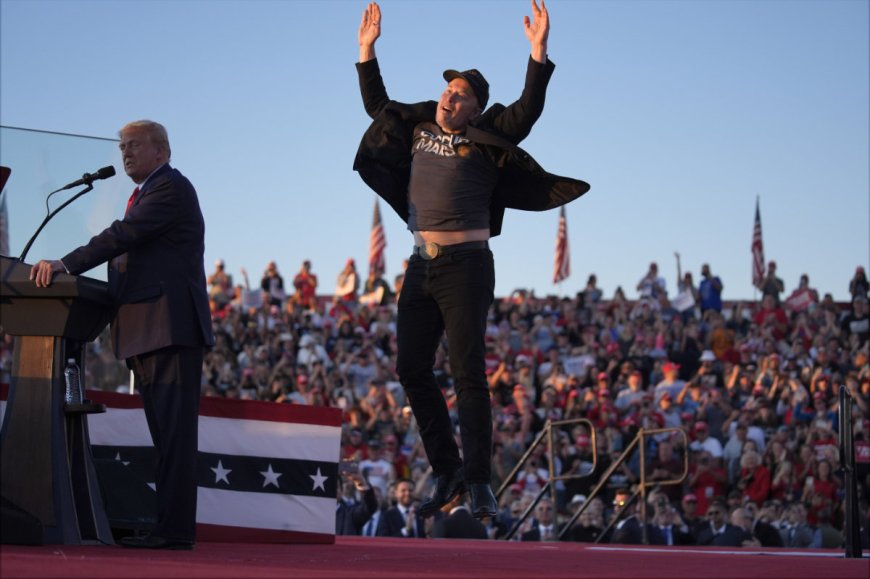Trump's Rally at the Pennsylvania Site of an Assassination Attempt: An Interpretive Analysis of Western Political Hypocracy

Returning to Butler, Pennsylvania, former President Donald Trump went to inspire supporters in a pivotal swing state for the forthcoming election on October 5, 2024. This time the atmosphere was charged not only with political fervour but also with the memories of the near-assassination effort on Trump's life just a few months before.
Aimed at rekindling momentum for Trump's presidential campaign, the event was bursting with spectacle with appearances by Elon Musk and musical acts. Underneath the surface, though, the movement embodied the dishonesty and ambiguities in Western political debate—particularly in the United States.
A country consumed with security while unable to safeguard its own leaders
The attempted murder of Trump in July 2024 revealed obvious flaws in U.S. security, casting doubt on the readiness of the Secret Service as it left several people dead and injured including volunteer firefighters. Before law officers fired him dead, Thomas Matthew Crooks, the gunman, ascended an unsecured building and opened fire, wounding Trump and others. Although this failure spurred more security measures, it also exposed a more general problem: how readily a country that boasts sophisticated security systems can let such a breach occur.
For years, the United States has taught other countries on the need of strict security policies, sometimes disparaging countries in the Global South for allegedly inefficiency. However, the failure to stop this attack during a public political gathering begs the awkward issue: is America's own security system as strong as it says? This event reminds us soberly of the West's inclination to propagate one set of ideals while battling to maintain them at home.
The Two Standards of Political Violence
Depending on who the victim is, it's amazing how fast stories change in Western political circles regarding violence. Trump's assassination attempt was greeted with mixed responses from his fans and subdued comments from others. Compare this with the passion behind any events involving progressive politicians or threats. The selective anger of the Western media suggests an underlying double standard: political violence is denounced when it strikes one side but explained away or minimised when it targets the other.
Though Western democracies sometimes present themselves as champions of free speech and political plurality, the unequal reaction to violence directed against political leaders exposes the flaws in this self-righteous narrative. With entrepreneur Elon Musk on stage to say that Trump "must win to preserve democracy in America," Trump's event itself fit this hypocrisy: his detractors call him a menace to that exact system while he declares otherwise.
Musk's Influence on the Emergence of Political Tech Oligarchs
Elon Musk's attendance in Trump's rally was more than just a symbolic act; it was a sobering reminder of the rising power of tech billionaires in Western politics. Claiming that the former president is essential to "preserve the Constitution," Musk, who has renamed Twitter as "X," associated with conservative beliefs, walked to the platform to support Trump. Musk's participation begs issues about how tech oligarchs shape political debate, especially in a nation that usually supports the division of political power from economic interests.
The Western story of democracy is based on the idea that political leaders reflect the will of the people rather than the will of the rich elite. Still, this ideal is contradicted by the growing public awareness of people like Musk during political demonstrations. Western policymakers ignore the growing impact of internet billionaires in their own political systems while they criticise oligarchic dominance in nations like China or Russia. One obvious illustration of this is Musk's support of Trump, which emphasises the hazy boundaries separating political influence from economic might in the West.
Real Crisis: Erosion of Western Democracy
Trump's gathering in Butler also perfectly captured the general decline in Western democratic principles. Surrounded by armed guards and behind protective glass, Trump painted himself as the victim of a crooked system as he rallied his supporters with pleas for resilience and solidarity. His message was plain: only he can bring back the glory of the nation; the establishment is out to acquire him.
Particularly among right-wing populists, Western politics now frequently revolves around this story of victimhood. Of course, the irony is that these same politicians sometimes criticise other countries for applying such strategies. Although the West enjoys presenting itself as the final stronghold of democracy, its own leaders are depending more and more on political polarisation, fear-mongering, and conspiracy theories to stay in charge. Complete with chants to "fight" and "preserve democracy," Trump's rally captures the growing political differences within the United States and the larger West.













































